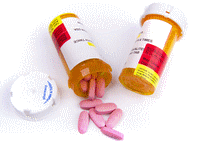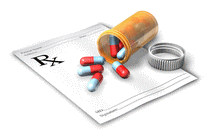The Effects of Medications
Posted: July 12, 2012
Direct Effects
-
 Concentration
Concentration
AMA Guides, Table 13-2, page 309
Criteria for Rating Impairment of Consciousness and Awareness
For Class 1 impairment, or 0%-14% WPI, the individual is expected to perform activities of daily living (ADL) independently but may need assistance with activities that require fine motor dexterity.
-
Dizzyness
AMA Guides, Table 17-5, page 529
Lower Limb Impairment Due to Gait Derangement
or Table 13-2, page 309
Table 17-5 can be used if the symptoms include difficulty walking for more than 5 blocks; continued pain; needs a cane when walking outside their home; can no longer play sports or run.
-
Sleep
AMA Guides, Table 13-4, page 317
Criteria for Rating Impairment Due to Sleep and Arousal Disorders
Use if the medication interrupts the sleep of the applicant. The symptoms can include the ability to complete most necessary work, but works less efficiently and cannot take on any new special projects.
Indirect Effects
-
Upper GI
AMA Guides, Table 6-3, page 121
Criteria for Rating Permanent Impairment Due to Upper Digestive Tract Disease
Gastric pain and painful episodes lasting up to 2 weeks, wake the applicant at night, and require antacids, food, and over-the-counter blockers for relief.
-
Lower GI
AMA Guides, Table 6-4, page 128
Criteria for Rating Permanent Impairment Due to Colonic Rectal Disorders
Use for colonic and rectal disorders if there is cramping with bowel movements or alternating diarrhea and constipation.
-
Respiratory
AMA Guides, Table 5-12, page 107
Impairment Classification for Respiratory Disorders, Using Pulmonary Function and Exercise Test Results
Use if pulmonary distress awakens the patient from their sleep or pulmonary distress while walking on level ground (the latter condition can be rated from 10%-25% WPI).
-
 Liver
Liver
AMA Guides, Table 6-7, page 133
Criteria for Rating Permanent Impairment Due to Liver Disease
Use when GGT is elevated. This suggests a Class 1 impairment of 0%-14%. Many medications (including analgesics, anti-psychotics, anti-diabetics, and others) and many illnesses (diabetes, obesity, and alcoholism) lead to hepatic inflammation. Pay close attention to the liver enzymes. The most sensitive indicator of hepatic damage is GGT (gamma glutamyl transpeptidase). The evaluation should include a test for GGT.
-
Kidney
AMA Guides, Table 7-1, page 146
Criteria for Rating Permanent Impairment Due to Upper Urinary Tract Disease
Use if creatinine levels are elevated. If the creatinine level is known before the injury and it doubles, the kidney has lost half of its function. In addition, an injured worker with only one kidney should be considered to already have a 10% WPI in addition to what is going on with the existing kidney and the impairments should be combined using the CVC.
-
Psyche
AMA Guides, Chapter 14, page 359
Has the doctor evaluated the medications necessary to control such symptoms as hallucinations? The medications may result in decreased motivation and level of activity. These side effects should be considered in evaluating the overall severity of the individual's impairment and ability to function.